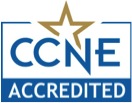The UMSL College of Nursing is dedicated to the pursuit of excellence and leadership through academic, clinical and research initiatives. We are proud to prepare nurses as clinicians, scientists and educators, and facilitate professional advancement through our innovative programs.
The UMSL College of Nursing is proud to be fully accredited/approved by the following bodies:
- The Bachelor of Science in Nursing (BSN), Doctor of Nursing Practice (DNP), and post-graduate APRN certificate programs at the University of Missouri-St. Louis are accredited by the Commission on Collegiate Nursing Education (CCNE), 655 K Street, NW, Suite 750, Washington, DC 20001, (202) 887-6791.”

- The prelicensure program is fully approved by the Missouri State Board of Nursing (MOSBON) which ensures that graduates of the pre-licensure track of the BSN program are eligible to apply to take the registered nurse licensure examination (NCLEX-RN). Completion of the nursing program does not guarantee eligibility to take the licensure examination, per section 335.066 RSMo of the Missouri Nursing Practice Act.
- The Doctor of Philosophy in Nursing (PhD) at the University of Missouri-St. Louis follows the national standards of the American Association of the Colleges of Nursing for PhD programs.
- All programs are accredited by the Higher Learning Commission (HLC), an accreditation agency recognized by the U.S. Department of Education.
Our History
The College of Nursing at UMSL was established as the School of Nursing in 1981. The original program was designed to provide an innovative upper division program leading to the baccalaureate degree, specifically designed for registered nurses that had graduated from hospital diploma or community college associate degree nursing programs.
In 1987, the first students were admitted to the Cooperative Master's in Nursing Program. This program was a cooperative endeavor between the University of Missouri–St. Louis and University of Missouri–Kansas City Schools of Nursing within the University of Missouri System. The program offered advanced study in Nursing Care of the Adult, Nursing of Children, and Women's Health. The program also prepared nurses to function as administrators, educators, or clinical specialists and practitioners in family, pediatrics, neonatal, and women's health. In 1993 the UMSL school of Nursing received independent degree granting authority for the MSN program. Over the years the emphasis areas in the MSN program changed to address workforce needs. The MSN program admitted the last students in fall 2015 with the planned transition of all the nurse practitioner options to the DNP program consistent with the national recommendations that entry level preparation for advanced practice nursing be in DNP programs.
In 1994, the PhD program began at the College of Nursing. The initial offering of the program was accomplished through inter-campus cooperative activities offered between the St. Louis, Columbia, and Kansas City Schools of Nursing.
In 2008, a Doctor of Nursing Practice (DNP) program began with a post-master’s entry option. The first post-baccalaureate students began the DNP program in the fall of 2015.
The BSN-DNP program includes all of the nurse practitioner options that were available in the MSN program: adult/gerontology primary care nurse practitioner, family nurse practitioner, pediatric primary care nurse practitioner, women’s health nurse practitioner, and psychiatric-mental health nurse practitioner. In fall 2016, an acute care pediatric nurse practitioner emphasis area was added.
The School of Nursing was formally designated as the Barnes College of Nursing at the University of Missouri–St. Louis in 1994 with the addition of a well-established pre-licensure undergraduate nursing program to the University through the merger with the Barnes College of Nursing. In 2005 Barnes Jewish Hospital exercised the option to reclaim the Barnes name and the designation was formally changed to the UMSL College of Nursing. In 2000, an Accelerated Option for individuals with a previous degree or significant college credit in another field was added to the pre-licensure baccalaureate nursing program.
Along with the University of Missouri–St. Louis accreditation by the Higher Learning Commission, the College of Nursing is accredited by the Commission on Collegiate Nursing Education. The pre-licensure options of the baccalaureate program are fully approved by the Missouri State Board of Nursing.
Today, the College has more than 1,100 students enrolled in our undergraduate and graduate programs: Bachelor of Science in Nursing (Traditional or Accelerated), Doctor of Nursing Practice, and Doctor of Philosophy in Nursing.
Clinical Partners
The UMSL College of Nursing is proud to enjoy partnerships with the leading healthcare providers in the region. Our graduate and undergraduate students have the opportunity for clinical experiences with numerous health care partners, giving them access to leading specialists, cutting-edge technology, and best-practices in a variety of settings. The College of Nursing is proud to have more than 100 clinical partners in Acute Care, Primary Care, and Community Care.
The policies of the College of Nursing comply with the Collected Rules of the Curators of the University of Missouri. We provide equal opportunity for all on the basis of demonstrated ability and competence without discrimination on the basis of race, color, religion, sex, sexual orientation, national origin, age, disability, or status as a Vietnam era veteran.

